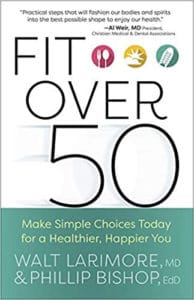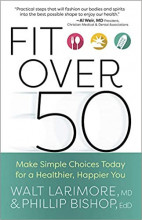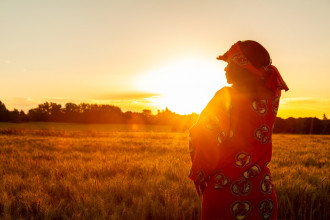Excerpt:
Dr. Walt Larimore: The physical is critical. God gives us four “T”’s, I believe, to steward. I had an old mentor teach me this. We always talk about time, treasure and talent. We don’t talk about the Temple of the Holy Spirit….
John Fuller: Hmm. Which is our body.
Walt: ….That we are to steward and care for. And the purpose of this book was to help people steward the Temple of the Holy Spirit, not just for themselves, but as an evangelistic tool. This is a book you can give to your grandparents, your aunts and uncles, your older colleagues, because it emphasizes not just the physical, but also the relational, emotional and spiritual
End of Excerpt
John: That’s Dr. Walt Larimore describing with some great passion about the importance of taking care of your body regardless of your age. We’re going to dial in specifically, though, to staying Fit over 50 on today’s episode of Focus on the Family, your host is Focus president and author Jim Daly. And I’m John Fuller.
Jim Daly: John, I so appreciate the wisdom and expertise that Dr. Walt Larimore brings to health-related topics and how he encourages us to live better as followers of Jesus Christ. And what I love most is his bedside manner. I mean, wouldn’t you love to have Walt as your family physician getting his advice and care for your family. I’m going to have to think about switching doctors…
Walt: When have I been at your bedside? (laughter)
Jim: Yeah. I know. That will – not yet, but I’m planning on it.
(LAUGHTER)
Walt: Jean – Jean might want to know what’s going on.
Jim: Bedside manner.
Walt: There you go. There you go.
Jim: I think it’s a hospital bed. Right? And the fact is, Walt, you do such a great job with these topics. You’ve written over 30 books. I mean, you’ve got to get up there. 20 more and you’ll be writing 50 books for those over 50. And, uh – but you’ve done such a great job and you’ve really brought these medical context down to the folks who can really absorb them and – and then hopefully deploy them. That’s what’s wonderful about what you’ve done in many of the books you’ve written. So, thank you for doing that. And I’m looking forward to the second part of the discussion today. I think last time, John, was a lot of fun.
John: We did have a lot of fun.
Jim: (Laughter).
John: Learned some good stuff.
Jim: And I’m sure we’ll do that again today. But, uh, if you missed the program last time, get the download, get the app on your smartphone. You can listen that way or get a hold of us if you’re struggling with listening to it.
John: Yeah. Yeah. In fact, contact us if you have any questions or your internet is out or whatever it is. 800-A-FAMILY. Or online, of course, we’re at focusonthefamily.com/broadcast. And we do have copies of Walt’s book right there on the site.
Jim: And Walt, even though I deeply respect you and admire you, I’m very thrilled to also welcome, maybe even more so, my wonderful wife, Jean, back to the program. Good to have you back, Jean.
Mrs. Jean Daly: Well, thank you. It’s a pleasure being back.
Jim: And I think for the women listening and watching on YouTube, this is all about, you know, women having a place at the table about health in your 50s. So, I’m not going to say exactly what 50 number you are.
Jean: Thank you.
(LAUGHTER)
Jean: I appreciate that. Just safely say I’m over 50.
Jim: You’re in the decade. And it was fun. But welcome back to both of you.
Walt: Good to be back.
Jean: It is good to be back.
Jim: Okay. Let’s get moving through the rest of the content wall. Last time we talked about the physical health and we’re going to continue some of that today. But I also want to address some of the other tire related analogy. So, first, as we ask you this question, why don’t you give us that recap of the four tires and the power steering. We didn’t touch on that last time. And then describe something that you discovered in Japan. I did study in Japan. I’m going to give it the actual saying, but it’s Shinrin Yoku. And that really is connecting with nature as part of the health and well-being of your soul. So, give us the four tires and then speak to the Japanese practice and what researchers found.
Walt: (Chuckles) That’d be great. Actually the – the model in my own mind – I’m just kind of simplistic in my thinking and these word pictures really help me. But to think of health has as an automobile, a vehicle, with four tires. And the research I’m talking about, not hundreds, not thousands, but tens of thousands of studies over the last 50 years show that there’s an intimate, intricate relationship between our physical health; our emotional mental health; our relational, social, family health; and our spiritual health. And if any one of those tires is out of alignment, are getting a little bit flat, it affects the entire vehicle.
Jim: You said flat, right?
Walt: Flat or flattening.
Jim: Oh, good. (laughter)
Walt: Or out of alignment. If they’re not operating as they’re designed to, you will not have as long a ride as you want or as comfortable a ride as you want. And you’re going to have some repair bills that you probably don’t want, some medical bills.
Jim: Or if you have too much air in those tires.
(LAUGHTER)
Walt: (Unintelligible) Well, yeah, you’ll be out of balance again…
Jim: There you go.
Walt: …Because God’s divinely designed us to be in balance. But of those four wheels, the critical one, the one that’s connected to the power steering, if you would, is the spiritual wheel.
Jim: Yeah, and we did touch on that last time. And – and we’ll continue to weave that into the discussion. Now for the Japanese observation. What are the Japanese doing so well that researchers were intrigued?
Walt: Well, they were the first to name this. The English variation of that is forest bathing if you would. (Chuckles) Which is kind of a nice word picture of bathing in the forest.
Jean: Yes.
Walt: And it relates to our mental or emotional health. And that is that just being outdoors in nature helps every portion of our health.
Jim: Hmm.
Walt: I mean, Scripture talks about the grandeur of the creation and how when we look at creation, we’re able to see God’s glory and His power. But in America, we don’t get outside very much. Studies show that Americans spend about 87% of their time indoors and an additional…
Jim: Man, that’s terrible.
Walt: …Additional 6% on top of 87% is in a vehicle. (Laughter)
Jim: Wow.
Walt: So, most of our day is indoors. Only about seven percent of our time is outdoors. And yet, studies looking through the decades show that the more time a person spends outdoors, the more likely they are to get to the next decade, irrespective of their physical or emotional health.
Jim: You know, it’s interesting, and Jean and I, we can speak to that. We’ve always enjoyed camping and hiking just as a hobby and as a thing to do. And we’ve done that with the boys, but I’ve never connected it to a spiritual or health wellness. Is it really that beneficial?
Walt: Jean, we were talking before about y’alls experience when you decided as a family to begin to go camping…
Jean: Yes.
Walt: …And the research is clear that families that camp together stay together. It’s kind of like that pray together, stay…
Jean: Right.
(LAUGHTER)
Walt: …Stay together.
Jim: We definitely…
Jim: …Got to pray because so much goes wrong.
(LAUGHTER)
John: Yeah.
Walt: But that – you’ve experienced that as a family, haven’t you?
Jean: Yes. Yes. We have. The – Jim and I were just talking about this. We feel like that is one of the most important things we did for our kids was camp together.
Jim: Oh, and they loved it.
Jean: It’s so bonding. But I also want to speak to the spending time outside. And for us, Jim and I, that’s easier because we live in a forest and we live in Colorado. But for me, going out on walks, I think I hit all those tires when Jim and I go on walks. I had the relational time with Jim. I’m getting outdoors and enjoying God’s beauty. I’m getting exercise. And the times that I walk alone, I am spending much time in prayer, and I can – it is just so good for my soul to be outside. And I recognize not everyone lives near a forest, but I would think even – even getting out and walking around a park that’s nearby or if you’re a parent with young children getting those kids in a stroller or putting them on the back of the bicycle, just getting outside is so important.
Walt: Well, Jean, you’re – you’re spot on target. And the research is clear even for our listeners who are in urban environments where there’s limited outdoor opportunity that even five minutes to 10 minutes in a park or outdoors a day has significant impact. It reduces stress, reduces fatigue, anxiety, it boosts levels of happiness. Other studies show that just that limited outdoor time boosts your immune system, enhances creativity, and helps you focus on what’s most important. And you said, helps you focus on prayer. But, Jim, I want to come back to something you said that just our listeners may not heard. You said, we went camping and the boys, what?
Jim: They loved it.
Walt: They loved it. Because a lot of parents think, oh, if I tried to unplug my kids from their television or their computer or their phone, if I go to somewhere where there’s no internet connection, they’re going to go crazy. And the research and experience tells us it’s the exact opposite. You get to see your kids. They get to see you. And you’ve preached it here forever, Jim. And that’s the fact that quality time with our kids, with our spouses, only occurs within quantity.
Jim: Right. Exactly.
Walt: Getting outdoors, making those walks, camping does that and increases it. And you guys have seen that as a family.
Jim: Yeah, it’s true. So, let’s encourage folks in that way. Get outside. Let’s turn that corner or turn that tire…
(LAUGHTER)
Jim: …And say, um, you know, going to mental health. This is a big issue, Walt. And again, you’re talking about Fit Over 50 and we started yesterday saying, “Yeah. That’s eat right and exercise some.” But it’s so much more than that. You described the four tires. One of those is the mental health issue. A lot of this can be taboo in the Christian community. We are chemistry. I mean, our bodies are made up in God’s creation with molecules and atoms and things that are interacting with each other. You’re a medical doctor. You’ve studied it. Brain chemistry can affect how we feel, our emotions, et cetera. So, jump into this mental health wellness statement and try to hit all those important areas.
Walt: Yeah, I think you – you’re pointing out a very important fact, and that is, uh, we know the four wheels are connected. So, when it comes to mental health, if we have relational issues it can affect mental health. If we have spiritual issues, it can affect mental health. The Church is – has known and it’s done a really good job of concentrating on that. But we can have physical issues that affect our mental health. And it can be neuro-hormonal issues. It can be medical illness issues that change our chemistries and change how we act and feel. And so, stress – I call it sadness – stress, anxiety and depression. The three most common mental health disorders that are in the developed world. And so, how can you recognize those? How can you recognize their origins? And then how can you find good counsel and good treatment? When we look at what people are fearful of as they age, the number one thing now isn’t cancer. It isn’t debilitating arthritis. It’s not trauma. It’s losing my mind.
Jean: It’s memories.
Walt: It’s the Alzheimer’s. It’s dementia that people are – are truly frightened of. And when we look in the world of supplements, we see people spending hundreds of millions of dollars. And the studies are clear that there is not one – so far, there is not one that works. But…
Jim: People are going to write in on this one.
Walt: They – and they can.
Jim: (Laughter).
Walt: They can. They should to find out what is the truth. Because if the church took the tens of millions of dollars it was spending on supplements to improve mental health and applied that to discipleship and evangelism…
Jim: Wow.
Walt: …We might have Christ back earlier. (Chuckles)
Jean: Wow.
Walt: I’ll come back sometime…
Jim: We’d have a healthier country, that’s for sure. That’s an amazing thought.
Walt: My – my next book is Natural Medicines because I wanted to see what works for Alzheimer’s and what works for dementia. I’m beginning to think about those things, and I have three or four parents who wrestled with that. And I was actually disappointed to find – I mean, the AARP did a massive study looking for anything that would work in this area and concluded there is nothing.
Jim: Huh.
Walt: The only thing that these supplements will do for prevention of Alzheimer, dementia, is thin your wallet and line someone else’s wallet. But irrespective, what can you do that works? And mental stimulation is one of those things. The five health habits we talked about yesterday about not smoking and exercising daily, moving daily, and getting your weight down – all affect your mental health when it comes to Alzheimer’s. Volunteering. Building healthy relationships. All the things we’ve talked about actually reduce your risk even if you have a genetic form of Alzheimer’s.
Jim: Huh.
Walt: Doing some of these intensive lifestyle changes reduces that risk.
John: Well, get in touch with us and ask for a copy of Dr. Walt Larimore’s book. This is Focus on the Family. Dr. Walt Larimore and Jean Daly are our guests. Jim Daly’s your host. And our phone number if you’d like to get in touch and then I’ll give Walt’s phone number if you have any complaints about what you’re hearing right now.
Jim: (Laughter).
John: I’m joking about that. Is 800, the letter A and the word FAMILY. Online we’re at focusonthefamily.com/broadcast.
Jim: Walt, you mentioned volunteering. I don’t want to miss that. It was subtle. What’s the benefit of volunteerism?
Walt: Well, especially volunteering with a spouse or a family member, because you get that family health, you get the relational health. But we are designed – we’re divinely designed to give. We are commanded to give, and we give of our time, our talent, our treasure and our Temple of the Holy Spirit. But when you look at the research, whether sociological research or mental health research or physical research, people who volunteer, who give of themselves always, almost always will say, “I’m gaining far more than I get.” Whether it’s financial giving, treasure, “I’m giving of time,” volunteering somewhere, what we can learn of others, how we can serve others, how we can love others, and how we can be demonstrable salt and light to people. It allows us to cultivate relationships with people who we may never meet any other way. And it allows many of them, some of them, to see Christians in a light they’ve never, ever seen before.
Jim: Yeah.
Walt: And I – I – in fact, I have a – a – I volunteer at a local ministry and I work alongside another physician who is just as liberal as can be.
Jim: (Chuckles).
Walt: I mean, our – our political beliefs and some of our social beliefs are just diametrically opposed. But he says, “You’re the only Christian I’ve ever met, that I actually like.”
(LAUGHTER)
Walt: And it wasn’t because of a sermon, it was because we were in the trenches working together.
Jim: Sure.
Walt: And he saw something different. And I remember telling him, I said, “I so appreciate you sharing that because there was a day that you and I would have been not recognizably different. But what you’ve seen tells me that God’s changing something inside me. And I appreciate that.” Other benefits, it reduces stress. Risk of depression. Keeps you mentally, physically active. As we’ve talked about, expands social connections, boosts self-esteem, gives purpose to life, less risk of isolation. It goes on and…
Jim: Well, I can’t wait to retire now.
(LAUGHTER)
Jim: I’m going to volunteer.
Jean: Well, and it’s – it’s a Biblical principle in loving your neighbor.
Jim: Yeah. Totally.
Walt: And we actually have a portion of a chapter on retirement…
Jim: (Laughing) Right.
Walt: I mean, there’s research showing it’s healthy. There’s research showing it’s not healthy. And we – Dr. Bishop and I sort of dissect that. But the bottom line is whether you retire or not, if you find something God has called you to do…
Jim: Give to it.
Walt: …And that you can give yourself to that helps all of your tires.
Jim: That’s the difference.
Walt: Yes.
Jim: And let me give a shout out to a wonderful volunteer group that we have here at Focus. A lot of people don’t realize that, but we have volunteers who work here at Focus. They come in. Some of them volunteer every day. And, uh, I’m so grateful to them. And they have a beautiful attitude about coming in. And I – you know, we keep tabs on how much they contribute to the ministry. I think now since the volunteer program started many years ago, we’re approaching – I think we’re approaching like ten million dollars of wages saved because of that volunteer activity.
Jean: It’s wonderful.
Jim: So, I’m tipping my hat to everyone here at Focus who volunteers. And encouraging people, if you’ve got time and you want to come here during a certain season and, you know, pitch yourself somewhere near Focus and come in and volunteer, I’d encourage you to get in touch with us.
John: Get in touch.
Jim: Walt, in the last couple of minutes here, let’s move through maybe a little more sensitive issue in marriage. You know, for those of us that are together as a couple, hopefully celebrating our 40-something anniversary, our 50-something anniversary. It’s that issue of physical intimacy still occurring. We don’t want to miss that. How critical is that? I think as you get older, you think that probably doesn’t happen much.
(LAUGHTER)
Jim: But what do you talk about when you encourage filling that tire full of, you know, intimate air? (Laughter)
Walt: Well, the research is interesting because as women go through menopause, a significant portion, their libido actually goes up, their sexual aggressiveness goes up. For some it goes down, some it goes up.
Jim: For those over 50?
Walt: Over 50.
Jim: Wow. Interesting.
Walt: So, there’s a variation. The tables can flip, if you would. But I remember, uh, Jerry Jenkins, and our audience will know the author, co-author, of the Left Behind series. Jerry’s not only a novelist, but he’s a biographer. And he wrote the biography for Billy Graham. And as such, he went and actually stayed with the Grahams in Montreat, North Carolina. But both Billy Graham and Ruth Graham at that point in their life were severely crippled. Billy was bed-bound, and Ruth was wheelchair bound. But at one point during the day, Ruth was being rolled into Billy’s room to visit. And Jerry said, “Do you want me to leave? Do you need a few minutes?” And he said, “No, no. We just we just have a few minutes together.” And she rolled over and they just…
Jim: Held hands.
Walt: …They just held hands.
John: Hmm.
Jean: Hmm.
Walt: They looked into each other’s eyes and they didn’t say anything. They just held hands.
Jim: That’s sweet.
Walt: And it went on and on and on. And then Ruth bent down and kissed his hand and he touched her forehead and she rolled out. And Billy said – this isn’t in the book – but Jerry says Billy said, “That is physical intimacy.”
Jean: Hmm.
Walt: And what a testament that that physical touch till the end becomes critical. And so, we address that critical issue and talk about some of the individual ways that you can deal with that. But I’m glad you brought it up, Jim, because it is important.
Jim: And again, it’s one of those taboo subjects that, unfortunately, the Church we don’t really talk about. And therefore, it can get unhealthy rather than in a God-centric orientation, very healthy. And that’s the point of mentioning it. And you talk about it in your book. Finally, Walt, we’re right down at the end here, I think this is a good place to end. And that’s on the idea of thankfulness as an ingredient to our health. You know, you look at what’s going on in the culture. You referenced it yesterday. A lot of anger, a lot of bitterness and it just seems in our culture that has so much. And I’ve traveled the world. I’ve been to about 70 countries with Focus on the Family over the years. And poorer countries seem to have so much better grasp on joy and contentment. And you come back to the Western world and the U.S. leading that where we have so much materially. And yet, in one study I saw 40% of our children are suffering from depression and anxiety. So, in a country of so much how are we so empty?
Walt: Yeah. I – this is a great place to land. Even Oprah would land here.
Jim: Okay. Good. I guess that’s a compliment. (Laughter)
Walt: She – she has gotten into this idea of gratitude because the research on gratitude is stunning. I remember the very first study that I saw – it came out of the University of Michigan. And the researchers there were looking at – they took three different groups of young people and they randomized them. One third of the group, they said, “At the end of each day, when you’re getting ready to go to bed, we want you to keep a journal. And we want you to write down five things that that you are unhappy about, that you’re angry about…”
Jim: Hmm.
Walt: “…That an injustice today or something that was wrong. Write five things that you basically want to grumble about…”
Jim: Yeah.
Walt: “…And then think about that for a few minutes before you go to bed.”
Walt: That was – The second group, they said, “What we want you to do at the end of each day is go through and think through the day of people you’ve met and compare yourself to them. How are you better off than them or how are they worse off than you? That kind of the jerk factor, if you would. Write those five down and then think on that.” And then the third group they said, “Write down five things you’re grateful for. Five…”
Jim: (Laughter) You know where this is going.
Walt: You know where this is going. “Five blessings that you had that day. And then each day, don’t repeat them, do new ones.” And they followed psychological and physiologic monitoring. Within three weeks, the benefits of the grateful group started to rise. And it continued all six months through the study.
Jim: Both physically and mentally.
Walt: Physically and mentally, even like cortisol levels, measures of stress, blood pressure levels…
Jim: Wow.
Jean: Yes.
Walt: …Blood sugar levels, weight improved, Jim.
(LAUGHTER)
Walt: You may want to look at a gratitude change…
Jim: I’m not really grumpy.
(CROSSTALK)
Jim: I can’t even gratify things I write down.
(LAUGHTER)
Walt: But the gift of gratitude and being able to be grateful to our Father in heaven. And to be able to be grateful for everything that He has brought to us. My belief is that everything that He allows or everything that He causes is for His glory and our good.
Jim: Yeah.
Walt: We just have to look through to find out not why is it happening, but God what are You doing? What are You trying to teach me?
Jim: I’ve got my grumpy entry ready.
Walt: (Laughter).
Jim: Had a terrible cheeseburger. Treated me so poorly today…
(LAUGHTER)
Jim: …As I ate it. Although it tasted good. It was very rude to me.
Walt: Jean – Jean, I’m noticing a victim contact…
(LAUGHTER)
Walt: …Thing going on here.
Jim: (Unintelligible), Jean.
Jean: Well, many years ago I was a part of a prayer group and it was actually Deb Minnery who started using…
Jim: Who used to – her husband, Tom, used to work here at Focus.
Jean: Yes.
Jim: Great, great couple.
Jean: Yes. A good friend. And she’d started using – it’s an ACTS acronym for prayer and it’s adoration and confession and thanksgiving and supplication. And – and she demonstrated starting prayer with thanksgiving. And I probably, like many people, would maybe thank God very quickly and then launch into my requests. So, I had to really train myself to do this. It was starting a new habit. And thanking God for His character, for His mercy, His grace, His peace…
Jim: His creation.
Jean: …His sovereignty. Yes. And then His creation. And really spending several minutes thanking God for His character. And we can all do that regardless of our circumstances. And not only did that revolutionize my prayer time, but it really helped transform me into a more grateful and thankful person.
Walt: Well, I bet it helps you understand the command that God gives us in Philippians 4:4 that we’re to “rejoice always…”
Jean: Yes.
Walt: “…For this is God’s will for you in Christ Jesus.” Why is that command there? In the midst of the storm, if you find gratitude, if you find blessing, the research shows that you’re going to benefit physically, you’re going to benefit emotionally. Feelings of well-being, feelings of happiness and blessedness rise up. Even your ability to cope with the storms improves when you can begin to look for God, what are You doing here? How are You changing me? How are You glorifying Yourself? And it’s made a difference for you.
Jean: Absolutely.
Jim: Well, Walt, you’ve said it well these past couple of days. And I would encourage our listeners, get a copy of Walt’s wonderful book, Fit Over 50. These are simple things that we can apply to have a better health perspective, not just physically, but mentally, emotionally, spiritually. All of the tires on the vehicle. You’ve done a wonderful job, Walt. And Jean, thank you. I think people are going to write in and say, “We want more of Jean.” (laughter)
Walt: And they – they should.
Jim: So, plan on being here more often.
Walt: And they should.
Jim: But, uh, it’s been great to have you with us.
Walt: Well, Jim, thanks to Focus. Barb and I, as a young couple, newlyweds, newly in the faith and new parents, our lives were transformed by the – by the Biblical principles that Focus on the Family has always espoused. And it is an incredible joy and a great privilege to be able to give back a little bit. But thank you for what you guys do.
Jim: And I appreciate that. Dr. Dobson did a great job laying the foundation in and our goal is to take it forward and keep applying it and hopefully reaching younger families to do the things that they need to do to have a healthy perspective and a godly perspective. So, thank you for that.
John: Well, we want to make sure that you get a copy of Fit over 50 and that we serve you in any need you might have beyond this particular topic. We’re here to serve and our number is 800, the letter A and the word FAMILY. 800-232-6459. Or stop by our website. That’s focusonthefamily.com/broadcast. Please, if you can, make a donation to Focus on the Family. Jim, we need the support of friends who are listening right now and watching.
Jim: That’s so true. I mean the lockdown, the shut in, whatever we want to call it, the pandemic, you know, has pulled down some of the giving. And we get that. We know that 40 million people are out of work. But if you can’t support Focus – maybe you haven’t. You’ve listened for a long time and just haven’t thought about it. Now would be a great time to support the ministry. We are donor funded and we would deeply appreciate your support right now.
John: And one and one reason now is such a crucial time is that we have some friends who have made kind of a limited time matching gift opportunity. Your donation gets doubled right now when you contact us and donate. So, please do that and know that your dollars will be stretched. They’ll be doubled by these friends and you’ll double the impact. And we’ll say thank you by sending a copy of this book. Fit Over 50: Make Simple Choices Today for a Healthier, Happier You. And again, our number 800, the letter A and the word FAMILY. And online you can donate and get that book at focusonthefamily.com/broadcast. Coming up next time, Shelia Erwin is mom to the film-making Erwin brothers and offers a light-hearted look at parenting.
Teaser:
Mrs. Shelia Erwin: People used to say, “Is there anything that you would have done differently with your boys?” Only two things: I would have been the perfect mother and they would have been the perfect children.
(LAUGHTER)
Shelia: And that did not happen. That did not happen. On either count.






















